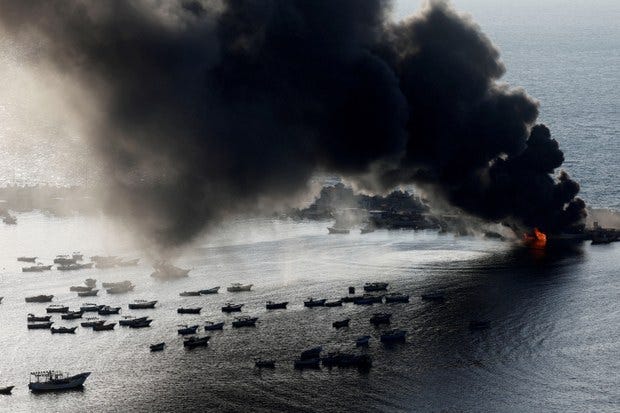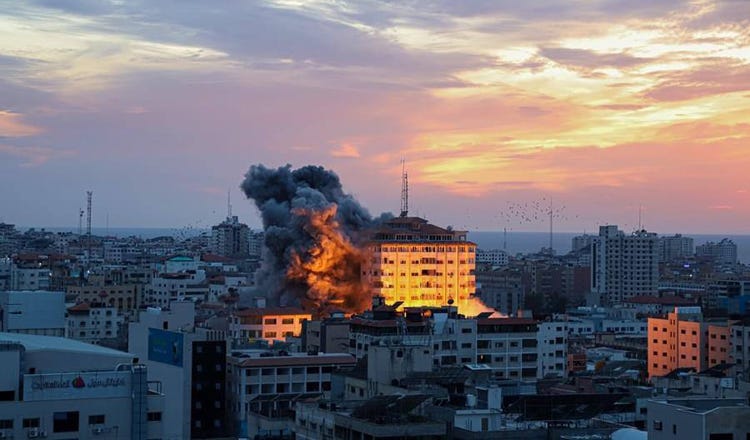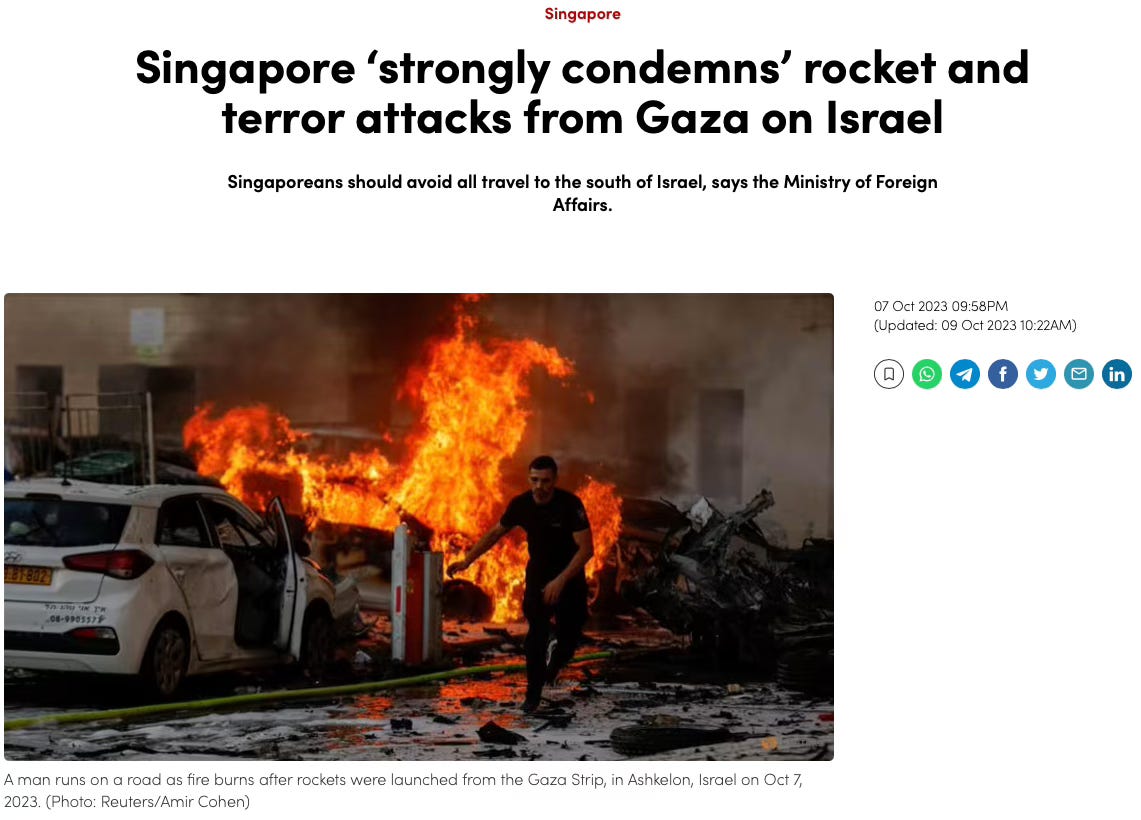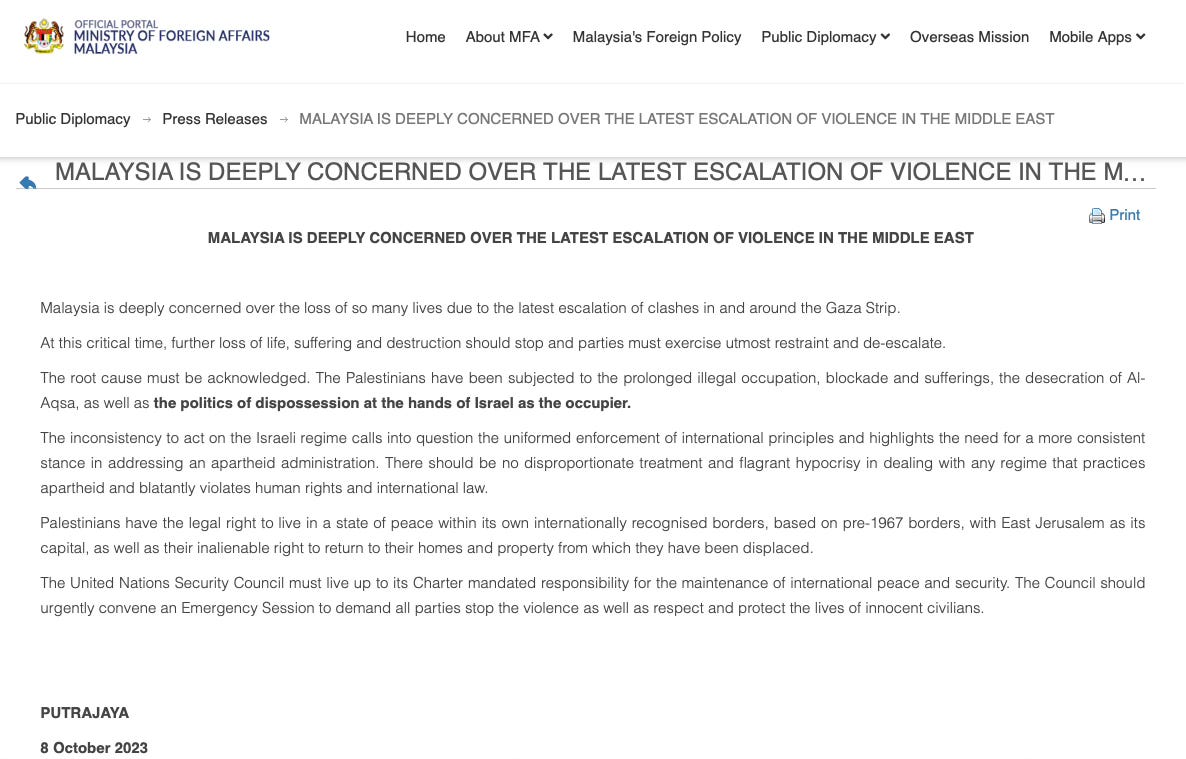Siege of Gaza
Cambodia calls for utmost restraint, ASEAN members issue mixed responses, Widodo UN-agreed parameters on “Israel’s occupation of Palestinian lands,”
UPDATE: As fighting raged for another day in a new war in the Middle East, Indonesia’s president said Tuesday that the Palestinian-Israeli conflict should be resolved according to United Nations-agreed parameters on “Israel’s occupation of Palestinian lands.”
Cambodia’s Ministry of Foreign Affairs and International Cooperation on Oct. 8 issued a statement over the Israel-Palestine conflict, calling upon all parties to exercise utmost restraint and seek avenues for de-escalation and ceasefire.
Along with much of the rest of the world, Southeast Asian governments in recent days issued official responses to the escalating conflict between Israel and the Palestinian militant group Hamas, following the latter’s attacks adjacent to the Gaza Strip in southern Israel.
Việt Nam is "profoundly concerned" over the escalating violence between Hamas and Israel that has led to massive civilian casualties, spokesperson for the Ministry of Foreign Affairs Phạm Thu Hằng said in a statement on Sunday.
Indonesian president: Immediately resolve Palestine-Israel conflict according to UN-agreed parameters
By Tria Dianti and Pizaro Gozali Idrus in Jakarta, Nontarat Phaicharoen in Bangkok, and BenarNews staff in Manila.
As fighting raged for another day in a new war in the Middle East, Indonesia’s president said Tuesday that the Palestinian-Israeli conflict should be resolved according to United Nations-agreed parameters on “Israel’s occupation of Palestinian lands.”
In his first public comments since Hamas fighters struck Israel on Saturday and the Israeli military hit back hard, Joko “Jokowi” Widodo, leader of the world’s most populous Muslim-majority country, urged an end to the bloodshed.
“Indonesia calls for the war and violence be stopped immediately to avoid further human casualties and destruction of property because the escalation of the conflict can cause greater humanitarian impact,” Jokowi said in a statement.
“The root cause of the conflict, which is the occupation of Palestinian land by Israel, must be resolved immediately in accordance with the parameters that have been agreed upon by the U.N.”
Indonesia staunchly supports the Palestinian cause and does not have diplomatic ties with Israel.
On Tuesday, Israel intensified its airstrikes on the Gaza Strip, where more than 2 million Palestinians live, and threatened to inflict a heavy toll on Hamas, the Associated Press news agency reported.
Hamas fighters had launched a surprise attack on Saturday from Gaza, using drones, rockets, missiles and assault weapons to breach the border fence and infiltrate towns in southern Israel.
Jokowi said his government was working to protect Indonesian citizens in Palestinian territories, especially 10 in Gaza. The foreign ministry said there were 275 Indonesians in Israel and Palestinian areas, with most of them there for religious purposes.
The Indonesian government has prepared a contingency plan to evacuate its citizens from the region in coordination with various parties through its embassies in Amman, Beirut and Cairo, the foreign ministry said.
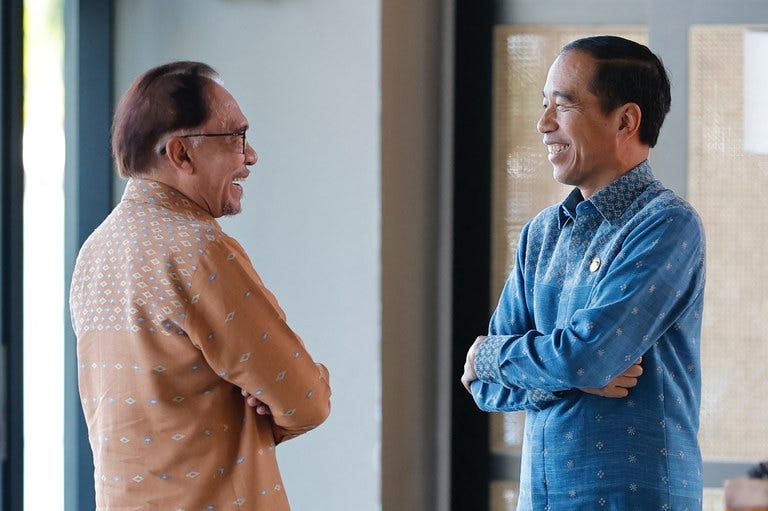
Indonesian Foreign Minister Retno Marsudi had been in touch with several countries and international organizations to seek an end to the violence, ministry spokesman Lalu Muhammad Iqbal said.
“The focus of the Indonesian government at the moment is the humanitarian situation, especially how to push for efforts to stop the escalation of violence and avoid more civilian casualties,” Iqbal told reporters.
In neighboring Malaysia on Tuesday, the country’s football association said that the Palestinian football team had withdrawn from a tournament in the Southeast Asian nation because of the “tense situation” in Gaza.
Separately, Malaysian Prime Minister Anwar Ibrahim said late Monday that he had discussed Palestine-Israel developments with Turkish President Recep Tayyip Erdogan.
Also on Monday, the Malaysian government announced it would allocate 1 million ringgit (U.S. $211,423) in humanitarian aid for Palestinians.
The war has already left at least 1,600 people dead on both sides – possibly many more – according to AP. Israel has also said that Hamas and other militant groups in Gaza had taken more than 150 soldiers and civilians captive.
The conflict is likely to worsen in the coming days. Israel increased the number of reservists to 360,000 on Tuesday, and there were reports that the military might launch a ground assault into Gaza.
On Monday, U.N. Secretary-General António Guterres had strong words for both Hamas and Israel as he condemned what he called “the abhorrent attacks by Hamas and others against Israeli towns and villages in the Gaza periphery.”
“This most recent violence does not come in a vacuum. The reality is that it grows out of a long-standing conflict, with a 56-year long occupation and no political end in sight,” the U.N. chief said in remarks to the press.
“It’s time to end this vicious circle of bloodshed, hatred and polarization.”
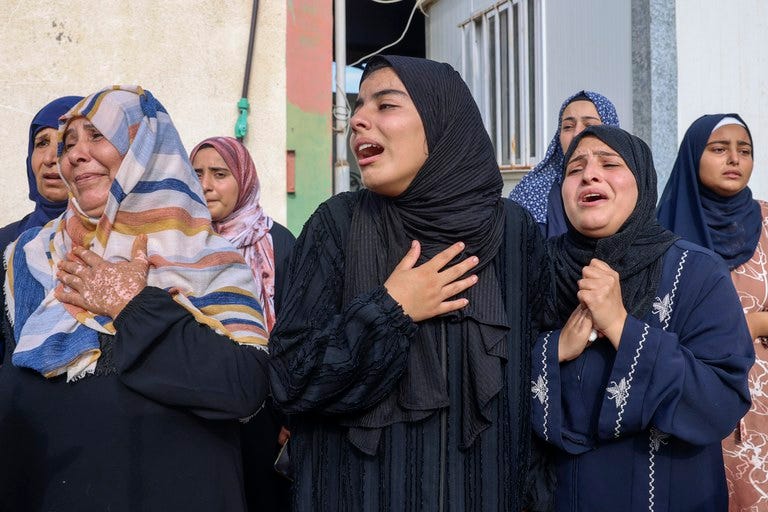
Evacuation of Thais begins Wednesday
Meanwhile, six more Thai citizens were confirmed killed in the fighting between Israeli forces and Hamas, taking the death toll of Thais in the conflict to 18, Kanchana Patarachoke, a Thai foreign ministry spokeswoman, told reporters.
Nine Thais were reported injured with 11 said to be abducted, she added.
“The fighting continues in Israel, particularly around the Gaza Strip. Both sides clashed as the Israelis had been attempting to regain control, cutting power grids and water supplies,” Kanchana said.
“Both Jerusalem and Tel Aviv came under attacks, while the Israelis launched offensives into Palestine.”
On Monday, the deputy Thai foreign minister said he had asked Egypt and the Palestinian Authority to help release the Thai hostages.
“As far as we discussed with partners, Hamas would not harm foreigners because they are not involved [in the disputes] and it does not want to expand the disputes,” Kanchana said, referring to other agencies the Thai government is coordinating with.
More than 4,533 Thais were working in areas of southern Israel close to the Gaza Strip as of August, according to the Thai Ministry of Labor. There are about 30,000 Thais working throughout Israel, according to the Thai Ministry of Foreign Affairs. Kanchana said that 3,226 had signed up to return home after the fighting broke out Saturday.
The first group of 15 evacuees was expected to leave Israel on Wednesday via an Israeli commercial flight and arrive in Suvarnabhumi Airport in Bangkok a day later. Another group of 80 Thais is expected to be evacuated on Oct. 18, Kanchana said.
In the Philippines, Foreign Affairs Secretary Enrique Manalo said Tuesday that the safety of the more than 30,000 Filipinos living and working in Israel remains a priority for the government.
There are approximately 40,000 Filipinos in Israel, but only 25,000 are legally documented, according to labor and migrant groups.
The Philippine Embassy in Tel Aviv said that six Filipinos were still missing – two men and four women – while one remains in hospital being treated for moderate injuries sustained during the rescue operation.
“Coordinating with Israeli authorities and local contacts, the embassy is exhausting all available means to ascertain the condition of the still missing Filipinos,” the embassy said.
The situation is expected to only get worse, said Manoch Aree, an assistant professor at Srinakharinwirot University in Bangkok.
“Today’s troubles do not lie only on Israel and Palestine but their respective allies – making the situation uncertain,” he said.
“Following the aerial bombardment, I believe the ground troops will move in, unless they change their mind. If Israel eventually occupies the Gaza Strip, Palestine’s allies may likely join the war.”
Read more here.
Israel-Palestine conflict: Cambodia calls for utmost restraint
Cambodia’s Ministry of Foreign Affairs and International Cooperation on Oct. 8 issued a statement over the Israel-Palestine conflict, calling upon all parties to exercise utmost restraint and seek avenues for de-escalation and ceasefire.
The full statement reads as follows:
“1. The Ministry of Foreign Affairs and International Cooperation of the Kingdom of Cambodia expresses deep regret over the outbreak of hostilities that took place on 7 October 2023. This tragic escalation of violence caused the death of hundreds of innocent people, including one Cambodian student in Israel. We convey our heartfelt condolences to the families and loved ones of those killed on both sides.
2. While considering the safety of all civilians, including that of Cambodian citizens, a top priority, Cambodia calls upon all parties to exercise utmost restraint and seek avenues for de-escalation and ceasefire, putting the priority on protecting civilian lives and upholding international humanitarian law. Cambodia condemns all forms of violence and terrorist acts.
3. Cambodia urges the international community to redouble its efforts to facilitate meaningful dialogue and negotiations towards a just and lasting peace. It is imperative that all parties engage in constructive talks aimed at addressing the root causes of the conflict and finding mutually
acceptable solutions.
4. Cambodia emphasises the importance of prioritising the pursuit of peace, justice, and security for all people in the region. It is essential for all parties involved to work toward a peaceful resolution that ensures the wellbeing and safety for all.”
AKP-C.Nika
Read more here.
How Southeast Asia Has Responded to the Israel-Hamas Conflict
Unsurprisingly, the region’s governments have been far from united in their responses to Hamas’ surprise attack on southern Israel.
By Sebastian Strangio (amended)
Along with much of the rest of the world, Southeast Asian governments in recent days issued official responses to the escalating conflict between Israel and the Palestinian militant group Hamas, following the latter’s attacks adjacent to the Gaza Strip in southern Israel.
Reactions in the region have been divided, reflecting Southeast Asia’s geographic distance from the conflict, its nations’ varying degrees of relations with Israel, and the proximity of the Israel-Palestine conflict to the politics of the region’s Muslim-majority nations.
Perhaps the most forthright condemnation was issued by Singapore, which has enjoyed a close relationship with Israel dating back to its independence in 1965. In a statement, a spokesperson for the Ministry of Foreign Affairs said that the city-state “strongly condemns the rocket and terror attacks from Gaza on Israel, which have resulted in deaths and injuries of many innocent civilians.” “Our thoughts are with the families of the victims,” it added. “We call for an immediate end to the violence and urge all sides to do their utmost to protect the safety and security of civilians.”
The Philippines also issued a relatively robust statement, perhaps unsurprisingly given its proximity to the United States, one of Israel’s closest international partners. In a statement, the Office of President Ferdinand Marcos Jr. expressed its condolences to those who have lost loved ones in the Hamas attacks.
While it did not name the Palestinian group directly, the statement said that the Philippines “condemns the attacks, especially against civilian populations,” according to the Philippine News Agency. It added that “the Philippines understands the right of states to self-defense in the light of external aggression as recognized in the United Nations Charter.” Separately, Marcos ordered the government to closely coordinate with the Philippine embassy in Tel Aviv and the Migrant Workers Office in Israel to help Filipinos affected by the ongoing conflict. Some 30,000 Filipino workers are present in Israel, but most of them are far from the southern region near the Gaza Strip.
Most other nations took a more muted approach, reflecting their perceptions of the seriousness of the conflict – but also its remoteness from Southeast Asian concerns. Jakkapong Sangmanee, Thailand’s deputy foreign affairs minister, offered his country’s “deepest condolences to the Government and people of Israel on the unfortunate loss of lives and injuries from this inhumane and indiscriminate act.” Despite referring explicitly to “the deadly Hamas-led attack against Israel,” Jakkapong said that Bangkok’s position was “one of neutrality.” It added that Thailand “promotes a solution that would allow Palestine and Israel to coexist.”
The Thai government’s main goal is to secure the release of the 11 Thai nationals who have also reportedly been taken hostage by Hamas, in addition to the 12 that were reportedly killed in the assaults on southern Israel. As of August, more than 4,533 Thais were working in Israel, where many are employed as farmhands.
Vietnam’s government took a similar approach of calling for calm and restraint, while refusing to weigh in strongly on one side or the other. Ministry of Foreign Affairs spokesperson Pham Thu Hang said in a statement on Sunday that Hanoi was “profoundly concerned” over the escalating violence between Hamas and Israel. “We call on relevant parties to exercise restraint, refrain from taking actions that complicate the situation, and soon resume negotiations to resolve disagreements through peaceful means,” she added. Meanwhile, the Cambodian Foreign Ministry issued a statement expressing its “deep regret” for the conflict and “condemns all forms of violence and terrorist acts.” It also called for “all parties to exercise utmost restraint and seek avenues for de-escalation and ceasefire.”
The nations that came closest to expressing a firm opinion on the Gaza conflict, and the nature of the Israel-Palestine conflict more generally, were Southeast Asia’s two largest Muslim-majority nations, where public support for the Palestinian cause is widespread. Indeed, Indonesia built a hospital in the Gaza Strip in 2011 from money donated by Indonesians, and one Palestinian staff member was reportedly killed in an Israeli counterstrike on Saturday.
These nations avoided directly referring to the attacks on civilians as “terrorism” or naming Hamas as the perpetrator, instead nesting them within the context of Israeli occupation.
“Indonesia is deeply concerned with the escalation of conflict between Palestine and Israel. Indonesia urges the immediate end of violence to avoid further human casualties,” Indonesia’s Foreign Ministry said in a statement published on X(formerly Twitter). In a separate tweet, it added, “The root of the conflict, namely the occupation of the Palestinian territories by Israel, must be resolved, in accordance with the parameters agreed upon by the U.N.”
Malaysia
Similarly, Malaysia’s government said that it was “deeply concerned over the loss of so many lives due to the latest escalation of clashes in and around the Gaza Strip,” and called on all parties “to exercise utmost restraint and de-escalate.”
It then went on to accuse the world of “flagrant hypocrisy in dealing with any regime [Israel] that practices apartheid and blatantly violates human rights and international law.”
“The root cause must be acknowledged,” it stated. “The Palestinians have been subjected to the prolonged illegal occupation, blockade and sufferings, the desecration of Al-Aqsa, as well as the politics of dispossession at the hands of Israel as the occupier.”
Read more here.
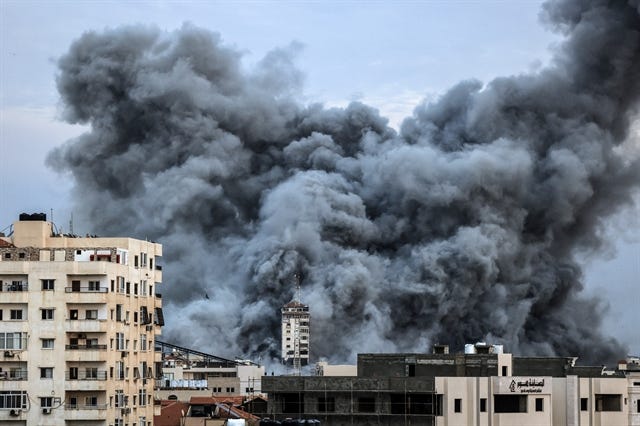
Việt Nam 'profoundly concerned' over Hamas-Israel violence
HÀ NỘI — Việt Nam is "profoundly concerned" over the escalating violence between Hamas and Israel that has led to massive civilian casualties, spokesperson for the Ministry of Foreign Affairs Phạm Thu Hằng said in a statement on Sunday.
Việt Nam is closely following the situation, she noted, as the Gaza strip saw the deadliest day in over 50 years.
"We call on relevant parties to exercise restraint, refrain from taking actions that complicate the situation, and soon resume negotiations to resolve disagreements through peaceful means, on the basis of international law and the relevant resolutions of the United Nations Security Council, and ensuring the safety and legitimate interests of civilians," the spokesperson remarked.
So far, Vietnamese citizens, including the Vietnamese community in Israel, officials on business trips, and tourists, have remained safe, according to the Vietnamese embassy in Israel.
The foreign ministry advises Vietnamese citizens to temporarily avoid areas of conflict. Vietnamese citizens in the region should closely monitor the situation, take necessary security measures, comply strictly with local government regulations, avoid large gatherings, and limit travel.
They are also told to immediately contact the Vietnamese Embassy in Israel for assistance when needed.
The embassy said it has deployed officers to maintain regular contact with the Vietnamese community in Israel to continuously update information and closely coordinate with relevant local authorities and diplomatic missions in the area to implement measures to protect Vietnamese citizens.
Over the weekend, Hamas forces launched a surprise military operation against Israel, shooting thousands of rockets at Israeli cities while other militants opened fires at Israeli settlers, killing hundreds and capturing numerous others.
The Israeli army has retaliated with attacks on many Hamas sites and residential buildings in the Gaza strip, resulting in the deaths of hundreds of Palestinians.
VNS
Read more here.




